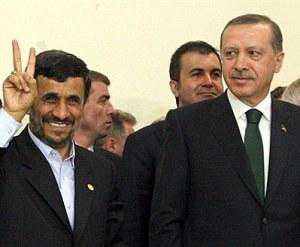By SUZAN FRASER (AP) – 23 hours ago
ANKARA, Turkey — Turkey rallied behind Prime Minister Recep Tayyip Erdogan in his blistering condemnation of Israel after its commando raid on an aid ship to Gaza.
But as dust settles from the May 31 attack, Turkey’s resurgent opposition seems to be gaining traction by articulating fears that Erdogan is steering NATO’s only Muslim member away from the West, jeopardizing EU membership efforts, and even undermining a long-running battle against separatist Kurds.
The views of the Republican People’s Party — which considers itself a guarantor of secular values and enjoys a power base among Western-leaning urban elites — are increasingly important.
The movement has a popular new leader following the resignation of its chairman over a sex scandal and many have high hopes that he can rejuvenate the party, presenting a viable alternative to Erdogan and anchoring Turkey firmly back in its Western orientation.
Kemal Kilicdaroglu made a name for himself by exposing corruption within Erdogan party’s that led to two senior officials stepping down.
While condemning the Israeli assault that killed eight Turks and a Turkish-American and calling on Jerusalem to end its Gaza blockade, Kilicdaroglu’s party has also criticized Erdogan’s confrontational style against Israel and accused the prime minister of trying to use outrage to win elections due next year.
“We are witnessing a serious crisis of confidence between (Erdogan’s party) and the West … This crisis must end immediately,” Kilicdaroglu said in a speech.
A recent opinion poll shows that the Republican People’s Party has made gains since Kilicdaroglu took the party reins, although Erdogan’s Justice and Democracy Party remains more popular.
The survey, conducted by the Konsensus research company for Haberturk newspaper and published Saturday, shows 38.8 percent backing Erdogan’s party against 31.3 percent for Kilicdaroglu’s Republicans — up from the 25 percent support for the party under the previous leadership. No margin of error was given.
“The belief that there is no alternative to (Erdogan’s party) has ended with Kilicdaroglu becoming chairman,” Konsensus general manager Murat Sari was quoted as saying.
The survey, however, showed that Kilicdaroglu gained support from a nationalist party, not from Erdogan’s ruling party, suggesting that skepticism about the opposition remains widespread.
The Republican Party has long projected a strict — and some say intolerant — form of secularism that has opposed among other things, young women wearing Islamic-style headscarves at universities.
It claims to be the heir to the legacy of Turkey’s modernizing founding father, Mustafa Kemal Ataturk. But its coziness with the military, elitist attitudes toward rural Turkey, and opposition to some reforms designed to boost Turkey’s EU membership chances have driven many liberal supporters away. Many also accept that Erdogan’s party, in power since 2002, has been a better steward of economic and social reforms.
For his part, Erdogan has alarmed liberals with his threats to scuttle Turkey’s longstanding alliance with Israel, his questioning of Washington’s international leadership, and his willingness to cultivate friendships with hardline Islamic nations like Iran and Syria.
Increasingly, analysts who praised Erdogan for raising Turkey’s standing in the Middle East are now warning that the government is acting out of emotion not reason in its dealings with Israel and the West.
“Unless someone says stop, the present atmosphere threatens to marginalize Turkey in the long term,” wrote Asli Aydintasbas, a columnist for liberal Milliyet newspaper.
Overwhelming support for Erdogan in elections in 2007 “were not for Hamas but for a ‘western Muslim’ Turkey that increased its global weight both in the East and in the West,” Aydintasbas said.
Military analysts have voiced concerns that Turkey’s new foreign policy is harming its interests, undermining its fight against autonomy-seeking Kurdish rebels.
The United States has been providing intelligence on Kurdish rebel movements in northern Iraq, where a bulk of the rebels are in hiding, while Turkey uses drones recently purchased from Israel to spy on the guerrilla group.
On Saturday, about 60 rebels attacked a military outpost on the Turkish-Iraqi border, killing nine soldiers, according to the military.
The attack raised questions as to how they were able to reach the outpost undetected and some speculated that the United States may have withheld crucial intelligence.
But Maj. Gen. Ferit Guler, secretary-general of the Turkish military, insisted that a successful intelligence cooperation with the United States was still in place.
The military has long supported Turkey’s military alliance with Israel, which has provided crucial military equipment, such as the drones and modernized Turkish fighter jets and tanks.
Erdogan insists it is committed to its alliance with the United States and NATO and that his government still seeks EU membership, although he has also accused European countries of having a “secret agenda” to keep Turkey out.
Copyright © 2010 The Associated Press. All rights reserved.
Related articles
- Turkey’s New Diplomacy
International Herald Tribune – 1 day ago - Turkey: no Blue Stream gas to Israel for now
Industrial Fuels and Power (blog) – 1 day ago - Turkish energy minister says no gas transportation to Israel via Blue Stream
Trend News Agency – 2 days ago - More coverage (1) »








 Retired Colonel Levent Gulmen is one of those on trialThirty-three serving and retired Turkish military officers have gone on trial on charges of plotting against the elected government.
Retired Colonel Levent Gulmen is one of those on trialThirty-three serving and retired Turkish military officers have gone on trial on charges of plotting against the elected government.